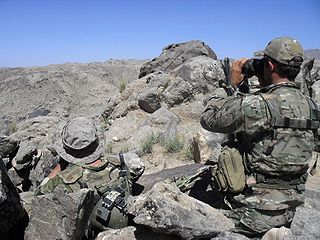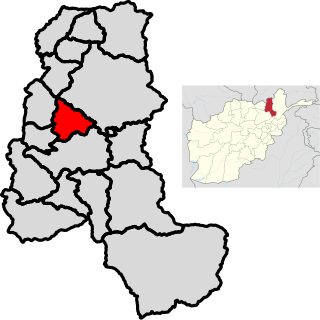Related Research Articles

Aybak is a provincial town, medieval caravan stop, and the headquarters of the Samangan Province in the district of the same name in the northern part of Afghanistan. As an ancient town and major Buddhist centre during the 4th and 5th centuries under the then Kushan rulers, it has the ruins of that period at a place known now as Takht-i-rustam, which is located on a hill above the town.
The following lists events that happened during 2002 in Afghanistan.
The following lists events that happened during 2004 in Afghanistan.
Events from the year 2007 in Afghanistan.

The Battle of Chora took place in and around the town of Chora, in Afghanistan's Orūzgān Province, from June 15–19, 2007. The fighting was between ISAF and Afghan forces on one side and Taliban forces on the other, for the control of the Chora District centre, regarded by the Taliban as a tactical target because it provides ground access from unsecured Gizab district in the north to the provincial capital of Tarin Kowt. According to some press reports, the fighting was the largest Taliban offensive of 2007 in Afghanistan, and resulted in the death of one American, two Dutch, and 16 Afghan soldiers, as well as approximately 58 civilians and 71 Taliban fighters.

The following addresses the events in Northern Afghanistan between April 2009 and 2014. While this part of the country had long been relatively peaceful compared to the all-out war zones of the south and east, tensions would flare up again in 2008 when the German soldiers deployed to the area came under attack more often, leading to the deaths of the several soldiers. Previously hindered by national caveats, the deteroriating security situation prompted the German-led Regional Command North to launch a series of operations to take on the rising insurgency. Concerted operations began after an insurgent attack on PRT Kunduz within minutes of German Chancellor Angela Merkel's departure from a visit. Within two years, the German presence would be doubled and additional reinforcements from the American ISAF contingent were called in, including heavy German armoured vehicles and US aviation assets, allowing for a more aggressive approach towards the insurgency.

The Shah Wali Kot Offensive was a five-day joint operation during the War in Afghanistan, conducted by Australian special forces and the Afghan National Army with US air support, between 10–14 June 2010. The operation took place in the Shah Wali Kot District of Kandahar Province, occurring in preparation for the coalition clearance of the province and resulting in heavy insurgent casualties.

Hazar Sumuch District is a district of Takhar Province, Afghanistan. The district was split-off from Taluqan District. Most people in the district work in agriculture. In late 2018, Hazar Sumuch was considered to be government influenced as opposed to the Taliban.
2003 in Afghanistan. A list of notable incidents in Afghanistan during 2003

The 2012 Afghanistan Quran burning protests were a series of protests of varying levels of violence which took place early in 2012 in response to the burning of Islamic religious material by soldiers from the United States Bagram Air Base in Afghanistan. On 22 February 2012, U.S. troops at Bagram Base disposed of copies of the Quran that had been used by Taliban prisoners to write messages to each other. As part of the disposal, parts of the books were burned. Afghan forces working at the base reported this, resulting in outraged Afghans besieging Bagram AFB, raining it with petrol bombs and stones. After five days of protest, 30 people had been killed, including four Americans. Over 200 people were wounded. International condemnation followed the burning of copies of the Quran, on 22 February 2012, from the library that is used by inmates at the base's detention facility. The protests included domestic riots which caused at least 41 deaths and at least 270 injuries.
The following lists events from 2014 in Afghanistan.
The following lists events that happened in 2013 in Afghanistan.
The following lists events that happened during 2015 in Afghanistan.
The following lists events that happened during 2016 in Afghanistan.
Events in the year 2017 in Afghanistan.
Events in the year 2018 in Afghanistan.

The Battle of Darzab was a major conflict between the Taliban and the Islamic State's Khorasan Province (IS-KP) who fought each other over control of Jowzjan Province's Darzab District in Afghanistan. Following heavy clashes, IS-KP was defeated, with most of the group's forces in Jowzjan Province killed or captured.
This article summarizes the history of the War in Afghanistan (2001–2021).